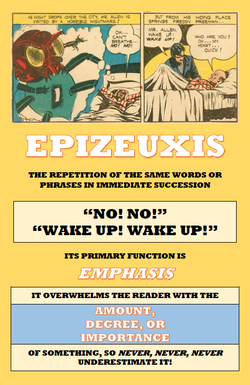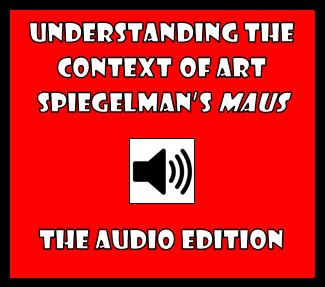A friend of mine who volunteers at a local public elementary school recently told me about an incident he found a little strange. He was working in the library when a grade four teacher brought her class in to get books to read. The teacher was giving the kids all of those instructions teachers give when they bring students to the library: be quiet, be respectful of other people, and ask the librarian for help. As the kids were heading for the stacks, however, she threw in one final instruction:
“Remember what I said in class – no comics!” My friend found it strange that the students—who routinely take out comics, graphic novels, and Japanese manga—were being instructed to avoid them. “I guess she thought they should be reading other stuff too,” he said. “No, that’s not it,” I replied. “She was trying to tell them that what they like to read is dumb.” I’ve often talked with teachers about my experiences as a young reader, and how I was encouraged to read “more challenging” books rather than the superhero comics, Choose Your Own Adventure stories, and Dungeons & Dragons modules that lined my bedroom shelves and eventually led me to pursue a Ph.D. in English literature. So, it concerns me when I hear stories about teachers actively dissuading students from reading comics, because it runs counter to everything that intelligent people know about reading. If you think about what the above teacher said to her class—if you really think about it—you’ll see that it does three things that you should never do to an aspiring reader. 1. It tells students that what they like to read is dumb. Imagine that you want to build your students into powerful, lifelong readers. Is your first order of business to tell them that what they like to read is a stupid waste of time? Well, when a teacher tells students “No comics” on a visit to the library that’s precisely the strategy being implemented. No doubt that teacher is hoping to develop the students into lifelong readers, but he or she is beginning the process by shaming their reading habits. If the teacher feels that strongly about comics, he or she might say “I would really prefer it if you chose something other than comics this time.” This is still pretty terrible, but at least it allows an opportunity for the students to ask the question, “Why?” But “No comics” means “No comics” and also, I think, “No discussion about comics” as well as “No discussion about why I said `No comics.” 2. It tells students that their reading habits should be determined by other people. A teacher who tells students what not to read puts them in a position that is altogether unfair. Seen as an arbiter of knowledge and an authority on what is right and what is wrong, a teacher wields tremendous power. The problem with the situation above is not simply that the students come to understand that the teacher sees comics as trivial, but that they themselves should somehow be comfortable in having their reading habits determined by other people. There is no better way to compromise children’s ability to love reading than to suggest that other people know better than they do what they should read. Kids are likely to believe you and stop reading what they like. Then, I’m afraid, they are also likely to stop reading altogether. 3. It teaches students that a library isn’t a place to discover things but only retrieve them. The problem with well-intentioned people, I find, is that they never think of the terrible, awful, well-intentioned things they say and do. When teachers tell students “No comics” on a visit to the school library, they teach students that a library—that great repository of possibilities filled with stories, known and unknown—is only a place to retrieve things that the teachers themselves deem acceptable. Now someone might make the argument that a kid taking out a comic for the fifth time isn’t “discovering” anything, but that represents a fundamental misunderstanding not only of children but of the act of reading. Such an argument presupposes that a child can’t discover or rediscover in the act of reading what he or she loves about the comic: its story, its characters, its beautiful artwork. It also presupposes that the child can’t discover anything of value in a new comic they might find while looking for the old one. Teaching children that they can only discover things that we allow them to find is to deprive them of the very act of discovery. About a week after my friend told me about the incident at the library, there was an update to his story. He related that the same teacher had come to the library again with her students, but without the admonition against comics. My elation was short-lived, however. As the students headed off to the stacks, the teacher once again gave them a reminder about something they had obviously talked about in class. “No Star Wars,” she said, as they went to go find their books. “Oh well,” I thought to myself, “I really hope they loaded up on comics.”
If you're interested in this article, you might also be interested in Ian Dawe's piece on the Sequart website, "Comics and Literacy: Still Struggling."
1 Comment
Beth Fuller
8/22/2015 02:47:27 am
Thank you for this post. As an avid reader, parent, and literacy coach I couldn't agree more. I, too, found my way to the joys of reading through the pages of comics. Little Lotta, Dot, and Richie Rich were my ambassadors to the world of reading. Thankfully, I had a mother who encouraged this, wisely understanding that my reading tastes would grow if she let me discover and devour my own reading choices. Thank you for sharing this important message!
Reply
Your comment will be posted after it is approved.
Leave a Reply. |
Glen DowneyDr. Glen Downey is an award-winning children's author, educator, and academic from Oakville, Ontario. He works as a children's writer for Rubicon Publishing, a reviewer for PW Comics World, an editor for the Sequart Organization, and serves as the Chair of English and Drama at The York School in Toronto. If you've found this site useful and would like to donate to Comics in Education, we'd really appreciate the support!
Archives
February 2019
|





 RSS Feed
RSS Feed
